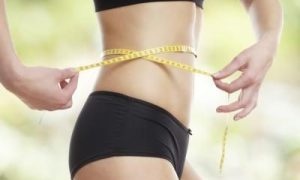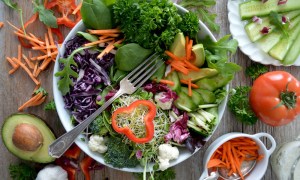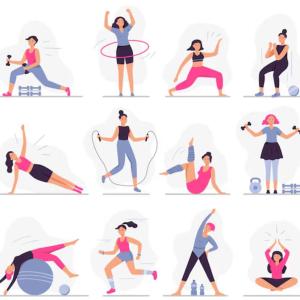
The alternative weight-loss regime of a ketogenic or ‘keto’ diet has been talked about everywhere, since Hollywood celebrities revealed they’d used this method to lose weight. But it’s a weight-loss method that has split opinion amongst even the most qualified health professionals. So let’s find out exactly what a ketogenic diet is, how it works and is it healthy for everyone or not?

Glucose energy from carbs
Our bodies usually store glucose-sugar from food in our liver and this is what the body uses as its energy source. Glucose comes from the carbohydrates we eat like bread, rice, pasta, potatoes and fruits and vegetables that also contain carbs, such as bananas and cauliflower or carrots etc. Most people love to eat carbs, especially in the form of cakes and snack products. And that’s good news for processed food manufacturers, as they can charge high prices for cheap foods that cause peaks and lows in our energy levels.
But if you stop eating carbs for a couple of days, the store of glucose in your liver drops dramatically. And that means you haven’t got enough glucose-energy to fuel your body. Your brain needs a lot of energy to run the body efficiently, and although the liver is able to produce a small amount of glucose from the protein you eat, it isn’t sufficient to meet your body’s needs.
Ketosis energy from fats
Therefore, when your body is starved of carbs, it has to find an alternative substance to provide energy. And so it switches from using glucose-sugar from carbs, to accessing your body fat and extracting ‘ketones’ as a source of energy. If you have a lot of extra body fat, it is often because you have eaten more carbs than your body needs. So your body stores it in the form of fat.
And the main idea behind using ketosis or fat-burning as a source of body-fuel, is that you stop adding to your fat store, and start burning it as a handy energy provider! So in ‘ketosis’, you don’t eat carbs and your body naturally switches to using up extra fat. And it keeps on producing ketones from the fat you eat instead. Finally, glucose from carbs disappears, your insulin levels drop and the liver starts to produce lots more ketone energy to keep your brain and body working.
Nutritional ketosis
Then within a certain period of time after you cut out carbs and eat more fat, the level of ketones in your blood increases. And when it reaches optimal level you enter what doctors call, ‘nutritional ketosis’. This is just a medical way of saying your liver has officially switched to fat as an alternative source of energy.
And at this stage your liver will be using up your store of body fat, so if you have too much body fat, your metabolism does actually ‘speed-up’ and ‘burn off’ extra weight. Some people are in favor of going without food entirely for a day or two, to get the process started quickly. However, for safety the healthy way is to follow a keto diet for a long period of time and try to continue avoiding carbs in your normal life altogether.
Main foods in a keto diet
A keto diet can be a good way to lose weight, especially for the obese individual who has a difficult time avoiding carbohydrates in their daily diet. Some people find that by substituting ketogenic saturated fats, red meat, and whole grains for chocolate, rice, cakes, potatoes and sugary drinks/snacks, they feel satisfied and don’t constantly crave carbs. Similarly, diabetic individuals can really improve their health and lose the pounds that have been so difficult to get rid of.
Weight loss & other benefits
People who follow a keto diet report that it’s one of the easiest ways to lose weight, because you will not experience so many hunger pangs. And as glucose-sugar constantly rises and falls as it provides energy from carb-rich meals and snacks, ketosis fat-burning provides a much steadier energy supply. This is thought to aid your brain in staying alert and improve your general concentration.
Is the keto diet suitable for everyone?
No, it’s not suitable for all members of society, but it is appropriate for most people! There are a few groups of people who need carbs or have underlying health conditions that need special attention:
- Women who breastfeed need plenty of carbs, so plan to start your keto diet after weaning.
- Diabetics who take insulin should only start a keto diet under the direct supervision of their health professional, as medications may need to be reduced.
- People who take medicine for raised blood pressure may well find that their blood pressure reduces quite quickly, so consult your health professional for supervision before your start a keto diet as your dosage of BP meds may need lowering.
- Serious athletes need extra carbs to support their high energy activities and build more muscle or add weight.
- Not suitable for anyone with a diagnosed eating disorder.
Opponents of the keto diet
On the other hand, some medics and scientists believe that adding large amounts of saturated fat to your diet can cause health problems associated with high cholesterol. Not everyone is the same when it comes to how much cholesterol their body retains from food. Some people have a genetic condition that produces high levels of bad cholesterol, even though they stick to a healthy diet rich in fish, fruits and vegetables.
Therefore, anyone starting a keto diet should have frequent cholesterol tests to ensure they aren’t building up too much bad cholesterol. Slim people with this condition sometimes carry hidden fat stores, so be sure to talk to your doctor or a diet specialist before embarking on any new slimming diet.
Consult your diet specialist
This is a general explanation of the purpose of a keto diet and is not intended in any way to be viewed as medical advice. It is intended to inform adults with serious weight problems and offer a topic for discussion with their medical experts.







